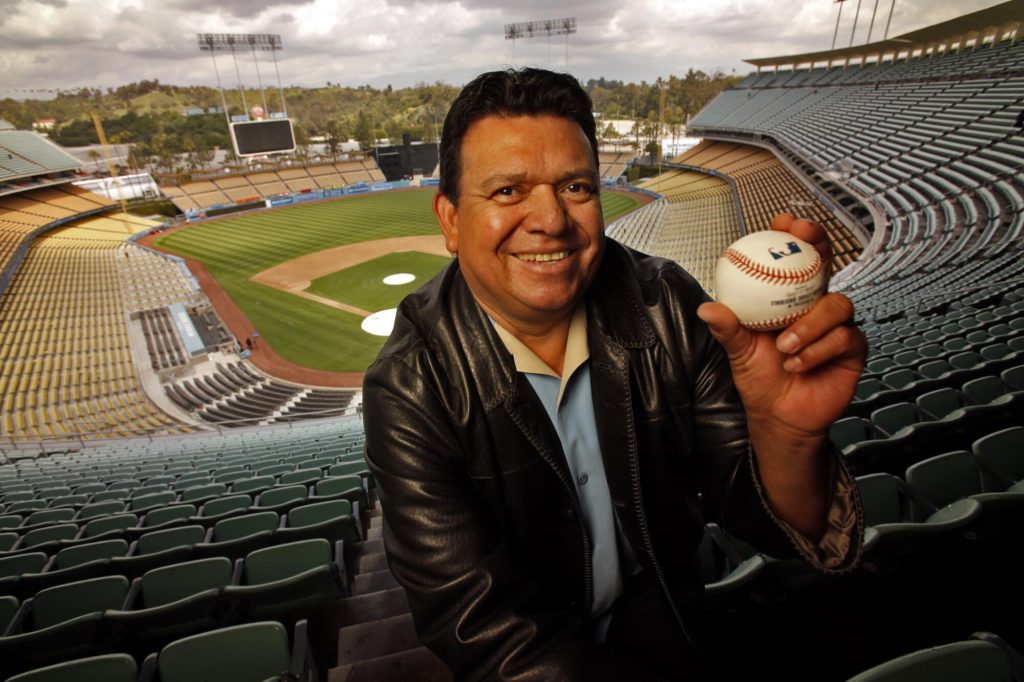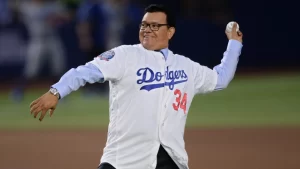
Fernando Valenzuela, the iconic pitcher whose meteoric rise with the Los Angeles Dodgers ignited the cultural phenomenon known as “Fernandomania,” has passed away at the age of 63, as confirmed by the Dodgers organization. Valenzuela’s influence on the game and the Latino community in the U.S. was profound and lasting.
Prior to the Dodgers’ postseason run in 2024, the team announced that Valenzuela would be stepping away from his radio broadcasting duties for the remainder of the season to focus on his health. Dodgers president and CEO Stan Kasten reflected on Valenzuela’s legacy, stating, “He is one of the most influential Dodgers ever and belongs on the Mount Rushmore of franchise heroes.”
MLB Commissioner Robert Manfred, Jr. described Valenzuela as “one of the most impactful players of his generation” and noted that he would be honored during the upcoming World Series.
Over a distinguished 17-year MLB career, Valenzuela earned six All-Star selections and finished with 173 regular season wins, alongside more than 2,000 strikeouts. While he spent 11 seasons with the Dodgers, he also played for the California Angels, St. Louis Cardinals, Philadelphia Phillies, Baltimore Orioles, and San Diego Padres.
Born in the small Mexican town of Etchohuaquila in Sonora as the youngest of 12 children, Valenzuela became an enduring symbol in Major League Baseball. His distinctive appearance—long, thick hair and a slightly stocky build—combined with his unique pitching style and calm demeanor, made him a beloved figure among fans, especially within the Latino community.
Valenzuela burst onto the scene in 1981 under extraordinary circumstances. With just 24 hours’ notice, he was named the Opening Day starting pitcher for the Dodgers due to injuries to the team’s top starters. At the time, he had only pitched 17 innings in the majors, making his debut as a starter unexpected.
Despite the pressure, Valenzuela dazzled on the mound, shutting out the defending NL West champion Houston Astros in a complete game, leading the Dodgers to a 2-0 victory. This performance was just the beginning of an extraordinary season, as he went on to win his first seven games, ultimately finishing his rookie year with a 13-7 record and a 2.48 ERA. He capped his rookie campaign with a complete game in the Dodgers’ World Series win against the New York Yankees.

In a historic achievement, Valenzuela became the only player in MLB history to win both the Cy Young Award and Rookie of the Year Award in the same season. His impact extended beyond statistics; he became a cultural icon and a source of pride for the Latino community in the U.S.
Famed Dodgers broadcaster Vin Scully described “Fernandomania” as a “religious experience,” capturing the fervor and excitement that surrounded Valenzuela’s games. Fans would flock to Dodger Stadium wearing his jerseys and chanting his name. The Dodgers even increased the number of Spanish-speaking ushers and expanded Spanish-language radio broadcasts, a clear acknowledgment of the growing Latino fanbase.
During the height of Fernandomania, the number of Mexican radio stations broadcasting Dodgers games skyrocketed from three to 17, and Spanish broadcasts enjoyed double the audience of Vin Scully’s English commentary.
Following his rookie season, Valenzuela continued to excel, making six consecutive All-Star teams and winning two Silver Slugger Awards and a Gold Glove. His best season came in 1986 when he recorded a career-high 21 wins, with 20 of those being complete games.
Valenzuela’s time with the Dodgers came to an end in 1991 when he was released during spring training. He went on to have stints with various teams but struggled to recapture his earlier success, ultimately retiring in 1997. After his playing career, he returned to the Dodgers as a Spanish-language radio broadcaster in 2003, continuing to connect with fans.
In 2023, the Dodgers honored Valenzuela by retiring his iconic jersey number 34, making him the first player in franchise history to receive this honor without being inducted into the National Baseball Hall of Fame.
Valenzuela is survived by his wife, Linda, and their four children. His legacy in baseball and the cultural impact he made will be remembered by fans and players alike for generations to come.







